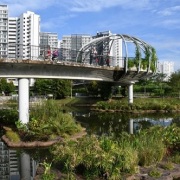ULI, PwC survey ranks Singapore as fair for investment, development prospects
Emerging Trends in Real Estate® Asia Pacific 2016, a real estate forecast is jointly published by the Urban Land Institute (ULI) and PwC.
Real estate activity in Asia next year will reflect a continuation of trends seen in 2015 – an abundance of capital flowing to core space, as well as a flight to safe havens in the region’s most developed and liquid markets, according to Emerging Trends in Real Estate® Asia Pacific 2016, a real estate forecast jointly published by the Urban Land Institute (ULI) and PwC. Japan and Australia remain the favorite countries for investment and development, with Tokyo, Sydney, Melbourne and Osaka taking four of the top five spots for promising markets in the Asia Pacific region. Ho Chi Minh City, rated fifth, rounds out the list of most favored markets.
“Asia’s real estate markets are the product of almost eight years of easy money from the world’s central banks. Although easing in the U.S. may be ending, both Japan and the European Union continue to provide liquidity, while interest rates in many Asian countries are lower than one year ago,” said ULI North Asia Chairman Raymond Chow, Executive Director, Hongkong Land Limited in Hong Kong. “
Emerging Trends, released during ULI Singapore’s 2015 Annual Meeting, provides an outlook on Asia Pacific real estate investment and development trends, real estate finance and capital markets, and trends by property sector and metropolitan area. It is based on the opinions of 343 internationally renowned real estate professionals, including investors, developers, property company representatives, lenders, brokers and consultants.
Survey respondents ranked Singapore eleventh for investment prospects and ninth for development, placing the city in the middle of the list of the 22 markets covered by the report. It attributes Singapore’s rating to the market’s loss of traction in 2015 following a surge in commercial rents in 2014. The report notes that businesses in the city are having problems expanding due to a tight labour market and ongoing restrictions on hiring foreign staff.
In addition, it points to a slow residential market, mainly due to government actions in 2013 to stem soaring home prices. Still, despite the tepid enthusiasm, “Singapore is always a market where institutions are looking to buy,” says Emerging Trends, adding that a number of major property purchases are expected to be complete before the end of 2015.
Click HERE to read more about the top five markets for 2016 plus other findings.











